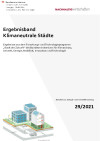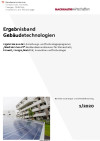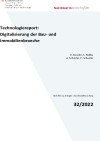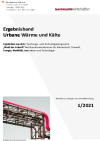Suchergebnisse
Ergebnisband „Klimaneutrale Städte"

Der vorliegende Ergebnisband stellt abgeschlossene Projekte aus dem Forschungs- und Technologieprogramm „Stadt der Zukunft“ des Bundesministeriums für Klimaschutz, Umwelt, Energie, Mobilität, Innovation und Technologie (BMK) im Bereich Klimaneutrale Städte vor. Die gewonnenen Erkenntnisse sollen eine Entwicklung in Richtung energieeffiziente und klimaverträgliche Stadt unterstützen, die auch dazu beiträgt, die Lebensqualität und die wirtschaftliche Standortattraktivität zu erhöhen.
Schriftenreihe
29/2021
Redaktionelle Gestaltung: Bianca Pfefferer, Hannes Warmuth (ÖGUT)
Herausgeber: BMK
Deutsch, 22 Seiten
Downloads zur Publikation
Ergebnisband „Gebäudetechnologien“

Der vorliegende Ergebnisband stellt abgeschlossene Projekte aus dem Forschungs- und Technologieprogramm „Stadt der Zukunft“ des Bundesministeriums für Klimaschutz, Umwelt, Energie, Mobilität, Innovation und Technologie (BMK) im Bereich innovativer Gebäudetechnologien vor. Die gewonnenen Erkenntnisse sollen eine Entwicklung in Richtung energieeffiziente und klimaverträgliche Stadt unterstützen, die auch dazu beiträgt, die Lebensqualität und die wirtschaftliche Standortattraktivität zu erhöhen.
Schriftenreihe
1/2020
Redaktionelle Gestaltung: Bianca Pfefferer, Hannes Warmuth (ÖGUT)
Herausgeber: BMK, Aktualisierung: Mai 2021
Deutsch, 25 Seiten
Downloads zur Publikation
Technologiereport: Digitalisierung der Bau- und Immobilienbranche

In der Vielzahl digitaler Möglichkeiten ist es nur sehr schwer möglich, einen Überblick zu behalten, Trends und Potentiale abzuschätzen sowie Zusammenhänge zu erkennen. Der vorliegende Report zielt daher darauf ab, den aktuellen Stand der Technik und die Markteinschätzung vielversprechender digitaler Technologien zu beschreiben. Es werden Informationen über konkrete Anwendungsfälle, Mehrwert und Herausforderungen der jeweiligen Technologien bereitgestellt. Die dargestellten Analysen dienen der Potentialbewertung und der strategischen Weichenstellung zur Integration der aktuell wichtigsten digitalen Technologien der Bau- und Immobilienbranche.
Schriftenreihe
32/2022
K. Künzler, S. Robbi, A. Schuster, P. Schuster
Herausgeber: BMK
Deutsch, 92 Seiten
Downloads zur Publikation
LINE-FEED - Plug-in Photovoltaik-Speicher für die Steckdose
Im Projekt LINE-FEED wurden Technologien entwickelt, die für einen Photovoltaik-Speicher benötigt werden, der von jedem Laien an einer gewöhnlichen Steckdose angeschlossen werden kann. Ziel war die Entwicklung eines Speichersystems für Haushalte in urbanen Räumen, welche selbst keine Möglichkeit der Installation einer Photovoltaikanlage haben.
LINE-FEED - Plug-in Photovoltaic Storage for the Wall Socket
The project LINE-FEED developed technologies that are required for a photovoltaic storage system which can be installed by anybody by simply plugging it into a wall socket. The aim was to create a storage system for households in urban areas that do not have the possibility to install a photovoltaic system themselves.
Ergebnisband „Urbane Wärme und Kälte“

Der vorliegende Ergebnisband stellt abgeschlossene Projekte aus dem Forschungs- und Technologieprogramm „Stadt der Zukunft“ des Bundesministeriums für Klimaschutz, Umwelt, Energie, Mobilität, Innovation und Technologie (BMK) im Bereich Urbane Wärme und Kälte vor. Die gewonnenen Erkenntnisse sollen eine Entwicklung in Richtung energieeffiziente und klimaverträgliche Stadt unterstützen, die auch dazu beiträgt, die Lebensqualität und die wirtschaftliche Standortattraktivität zu erhöhen.
Schriftenreihe
1/2021
Redaktionelle Gestaltung: Bianca Pfefferer, Hannes Warmuth (ÖGUT)
Herausgeber: BMK
Deutsch, 24 Seiten
Downloads zur Publikation
smart façade - energy potential of adaptive façade systems
A specially developed simulation model is employed to ascertain the energetic potential of adaptive façade systems. The dynamic behavior of the physical properties of the adaptive façade system reacts to both internal and external changing conditions. The goal was the development of an adaptive façade, which helps provide maximum comfort for the building occupants with minimum energy consumption.
FFF-TaliSys - Freiformflächen-Tageslichtsysteme für Fassaden und Oberlichter
Im Rahmen von FFF-TaliSys wurden neuartige Tageslichtsysteme auf Basis der Freiformflächentechnologie erarbeitet und bis zu Funktionsmustern weiterentwickelt. Innovative Systeme sollen die widersprüchlichen Anforderungen an Tageslichtsysteme bestmöglich lösen.
3D*3B - 3D-Betondruck und Bewehrung für emissionsarme biegebeanspruchte Tragstrukturen des Hochbaus
Interdisziplinäres Projekt zur Integration von 3D-Betondruckelementen in vorwiegend biegebeanspruchte Tragstrukturen mit dem Ziel der nachweisbaren Reduktion von klimarelevanten Emissionen im Baubereich. Die Ergebnisse dienen der umfassenden Beurteilung technischer, logistischer und klimarelevanter Aspekte.
solSPONGEhigh - Hohe solare Deckungsgrade durch thermisch aktivierte Bauteile im urbanen Umfeld
Im Forschungsprojekt solSPONGEhigh wurde die intensive Nutzung von thermisch aktivierten Bauteilen (TABs) als zusätzlicher thermischer Speicher in verschiedenen Gebäuden unter vorrangigem Einsatz von Solartechnologien (Solarthermie bzw. Photovoltaik) untersucht. Die Arbeitshypothese ging davon aus, dass durch die Aktivierung und Nutzung der bauteilimmanenten thermischen Speicher eine Deckung des Gebäudeenergiebedarfs mit Solartechnologien von bis zu 100 % erreicht werden könnte.
THERM-opti-BALCONY-P2 - Thermal Optimized Renovation of Balconies Phase 2: In-Situ-Pilot-Station
Pre-cast cantilever balconies represent a particular problem in the case of thermal rehabilitation of buildings. With the THERM-opti-BALKON-System a solution is currently being investigated under laboratory conditions. Phase 2 aims to create an in-situ-pilot-station. The most important object of study is the long-term behavior of the THERM-opti-BALKON-System.
smart façade - energetische Potentiale von adaptiven Fassadensystemen
Ermittlung der energetischen Potentiale von adaptiven Fassadensystemen unter Einsatz eines eigens dafür entwickelten Simulationsmodells. Das dynamische Verhalten der physikalischen Eigenschaften von adaptiven Fassaden wird dabei von den NutzerInnen und den klimatischen Umgebungsbedingungen beeinflusst. Ziel war die Abbildung einer adaptiven Fassade mit maximalem Komfort für die NutzerInnen bei gleichzeitig minimalem Energieeinsatz.
MOTIVE - Modellierung, Optimierung, und technische Integration von Vakuumglas-Elementen
Im Rahmen dieses Projekt fand eine Auseinandersetzung mit der Entwicklung von Anschlussdetails für die Implementierung von Vakuumglas in völlig neuartigen Fenstersystemen statt. Zu den Ergebnissen dieser Sondierung enstand ein europaweit erster Realisierungsversuch in Form eines Mock-Ups, und es wurden umfassende Kenntnis und Erfahrung in der Gestaltung von Baudetails von solchen innovativen Produkten gewonnen.
THERM-opti-BALKON-P2 - Thermisch optimierte Balkonsanierung Phase 2: In-Situ-Versuchsanlage
Bei der thermischen Sanierung von Gebäuden stellen frei auskragende Balkone ein besonderes Problem dar. Mit dem THERM-opti-BALKON-System wird derzeit unter Laborbedingungen ein diesbezüglicher Lösungsansatz erforscht. Phase 2 soll eine In-Situ-Versuchsanlage unter realen Bedingungen als Technologiedemonstrator schaffen. Wichtigster Untersuchungsgegenstand ist das Langzeitverhalten des THERM-opti-BALKON-Systems.
An innovative approach for facades with optimised noise protection and natural ventilation
The aim of this project was to advance the state of the art in the engineering of double-leaf building facades that facilitate natural ventilation while providing sufficient sound insulation. Realization of natural (window) ventilation is in some instances difficult due to a number of factors. Thereby, noise pollution (especially traffic noise) plays an important role. To address these issues, the project explored innovative solutions in terms of facade constructions for concurrent natural ventilation and noise control.
LEIse-Wand: Innovative Fassaden für natürliche Raumlüftung und optimierten Schallschutz
Natürliche Raumlüftung (im speziellen die sommerliche Nachtlüftung) wird im Falle herkömmlicher Fassadenkonstruktionen im innerstädtischen Bereich sehr oft durch das lärmbelastete Umfeld verunmöglicht. Innovative Entwicklungen von Fassaden, die natürliche Lüftung und hinreichenden Lärmschutz kombinieren, können zu einer wesentlichen Steigerung der Energieeffizienz bei gleichzeitiger Gewährleistung der Nutzeranforderungen führen.
see-it - Camera based, user centric daylight control system for optimized working conditions
In the project technologies in the field of building construction and building automation are being researched for quality and performance improvements in the workplace. The aim is to individualize the control of sun protection to the people who need to be protected from glare and overheating and hope to see through.
solSPONGEhigh - High solar fraction by thermally activated components in an urban environment
Within this project the intensive use of thermally activated building elements (TABs) as an additional thermal storage in different buildings, with solar technologies (thermal, PV) preferred for energy supply, was investigated. The aim was to activate and use the thermal storage potential that is immanent in the building elements and thereby achieve solar coverage of the building's heat demand of nearly 100 %.
FFF-TaliSys - Freeform Systems for Daylighting to be Integrated in a Façade and in a Skylight
In the course of the project FFF-TaliSys novel daylighting systems based on freeform surface technology were developed and implemented into functional models, thus, innovative systems that solve the contradictory requirements of daylighting systems.
3D*3B - 3D-Concret Printing, Reinforcement for low carbon and bending stressed structures.
The project is about 3D printed structural elements and their integration in building structures. The focus is predominantly set on bending stresses structural elements like panels and slabs. Results will point out technical, logistic and climate relevant aspects.
